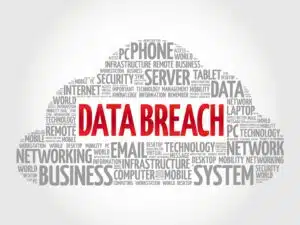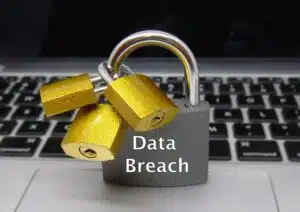Any business, of any size, can be at risk of a data breach. A personal data breach can be defined in Article 4 of the UK General Data Protection Regulation (UK GDPR) as a security breach that leads to the accidental or unlawful disclosure of, destruction, alteration, loss, or unauthorised access to one’s personal data. Personal data is any type of information, such as a postal address or personal email address, that can reveal someone’s identity. Due to these risks, many businesses protect themselves by having data breach insurance, especially in an increasingly digital world.
In this blog, we define both data breach insurance and cyber liability insurance, and how they differ. We also look at the benefits of both of these types of insurance, and how a business could suffer from a data breach if they do not have insurance.
If the business you work for, or the business you’re a customer of, has suffered a data breach that has compromised your personal data, our expert No Win No Fee solicitors are here to help you. If you have a chat with our team today, they can tell you whether you’re eligible for data breach compensation. It is free to contact us if you:
- Call us on 0330 0434072
- Fill in our make a claim form.
- Message in our live support chat.
Jump To A Section
- What Is Data Breach Insurance?
- How Can Data Breach Insurance Help My Business?
- What Cyber Risks Could Your Business Be Protected From?
- What Could Happen If You Don’t Have Insurance For A Data Breach?
- Read More About Data Breaches
What Is Data Breach Insurance?
Having data breach insurance or cyber liability insurance offers a robust defence against a range of cyber attacks and threats to lower the risk of a business facing a data breach.
You may have heard this insurance be referred to as cyber insurance. However, they are slightly different.
Both types of insurance provide first-party coverage. This covers the costs that are directly related to the exposed data after a personal data breach, such as credit monitoring and lost revenue.
Alternatively, here are the differences:
- Data breach insurance also covers non-cyber/physical losses. This means that this type of insurance can protect a business from data breaches that don’t happen on a computer. For example, if someone infiltrates the records room at the doctors.
- Cyber insurance also provides third-party coverage. This covers the legal costs made against the business, such as regulatory fines and attorney fees. With this type of insurance, you are legally protected.
How Can Data Breach Insurance Help My Business?
Having data breach insurance, and cyber insurance, doesn’t just offer financial protection, but can cover a broad range of issues that can emerge from a data breach.
Here are some examples of the benefits a business can receive from having this particular insurance:
- It can provide guidance for investing in effective cybersecurity controls.
- Help cover the costs of crisis communication.
- Help cover financial losses due the interruptions to the business while the data breach is being rectified.
- Cover the costs of legal advice and representation.
- Help with managing reputation harm and preserving client relationships that may have been affected due to the data breach.
- It can help cover the costs of any compensation that may need to be awarded to those affected by the data breach.
To see whether you may be eligible to receive compensation following a data breach of your personal data, you can contact our advisors.
What Cyber Risks Could Your Business Be Protected From?
Here are some potential cyber incidents and risks that any company could face:
- Ransomware and malware.
- Phishing.
- Endpoint attacks.
- Supply chain attacks.
- Inadequate patch management.
- Artificial Intelligence attacks.
- Cryptojacking.
- Formjacking.
Aside from having protective insurance, here are some steps an organisation can take to help mitigate these risks:
- Implement strong password policies and software.
- Educate and train staff about data protection and cybersecurity.
- Regularly update the cybersecurity system and anti-virus software.
- Implement multi-factor authentication.
- Restrict data access through security clearance policies.
If an organisation has failed to safely store, process, or handle your personal data, please contact us today.
What Could Happen If You Don’t Have Insurance For A Data Breach?
A business could face significant operational and financial losses if they experience a cyber attack and do not have data breach insurance, including:
- Fines by the ico or other regulators. This is because if you are a data controller, you have a legal obligation to protect the personal data of data subjects.
- Legal costs. A business may have to pay for damages if data subjects bring a case to court.
- Damage to reputation. Customers could lose trust after having their personal data breached, leading to loss of business.
- System restoration. Organisations may have to restore their online systems, meaning they might have to pay for external professionals, software, and hardware.
Contact Us
If a business has breached your personal data, please speak with our team today. Our expert data breach solicitors may be able to help you claim compensation. Our contact services are live 24/7:
- Call us on 0330 0434072.
- Fill in our make a claim form.
- Message in our live support chat.
Read More About Data Breaches
Here are a few of our other data breach guides:
- Look at some examples of data breach compensation amounts in the UK to learn about what could be awarded when a claim is successful.
- Learn how to make a bank data breach claim.
- Find out what to do if your personal data was breached on a website.
Alternatively, here are some external pages which might help you:
- ICO – how to avoid data protection fines.
- Gov.UK – information about the Data Protection Act 2018.
- Gov.UK – Article 82 of the UK GDPR, which provides the eligibility criteria for making a data breach claim.
Thank you for reading our blog today on data breach insurance and cyber liability insurance. If you have any questions at all about cyber insurance policies and data breach coverage, please contact us.




